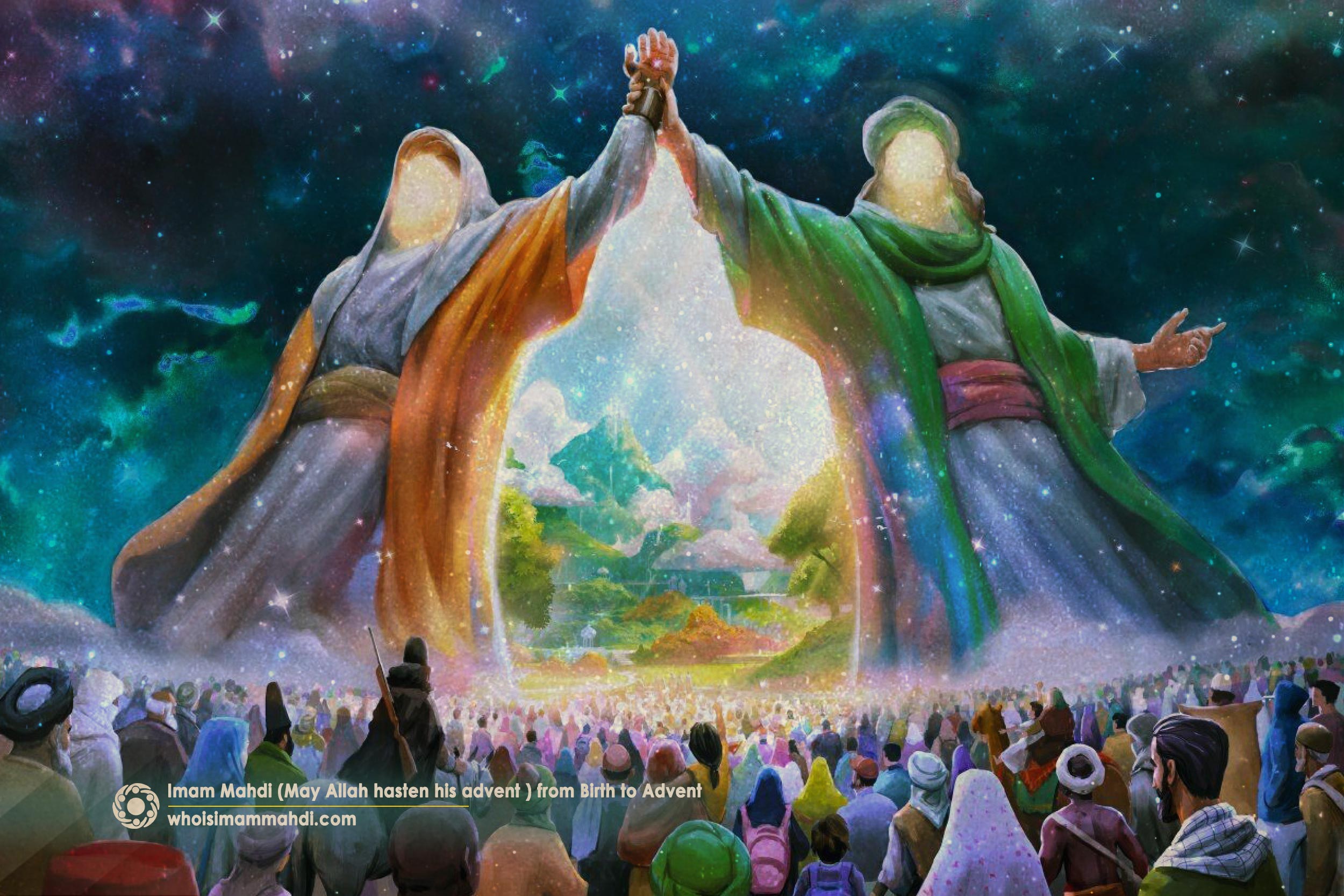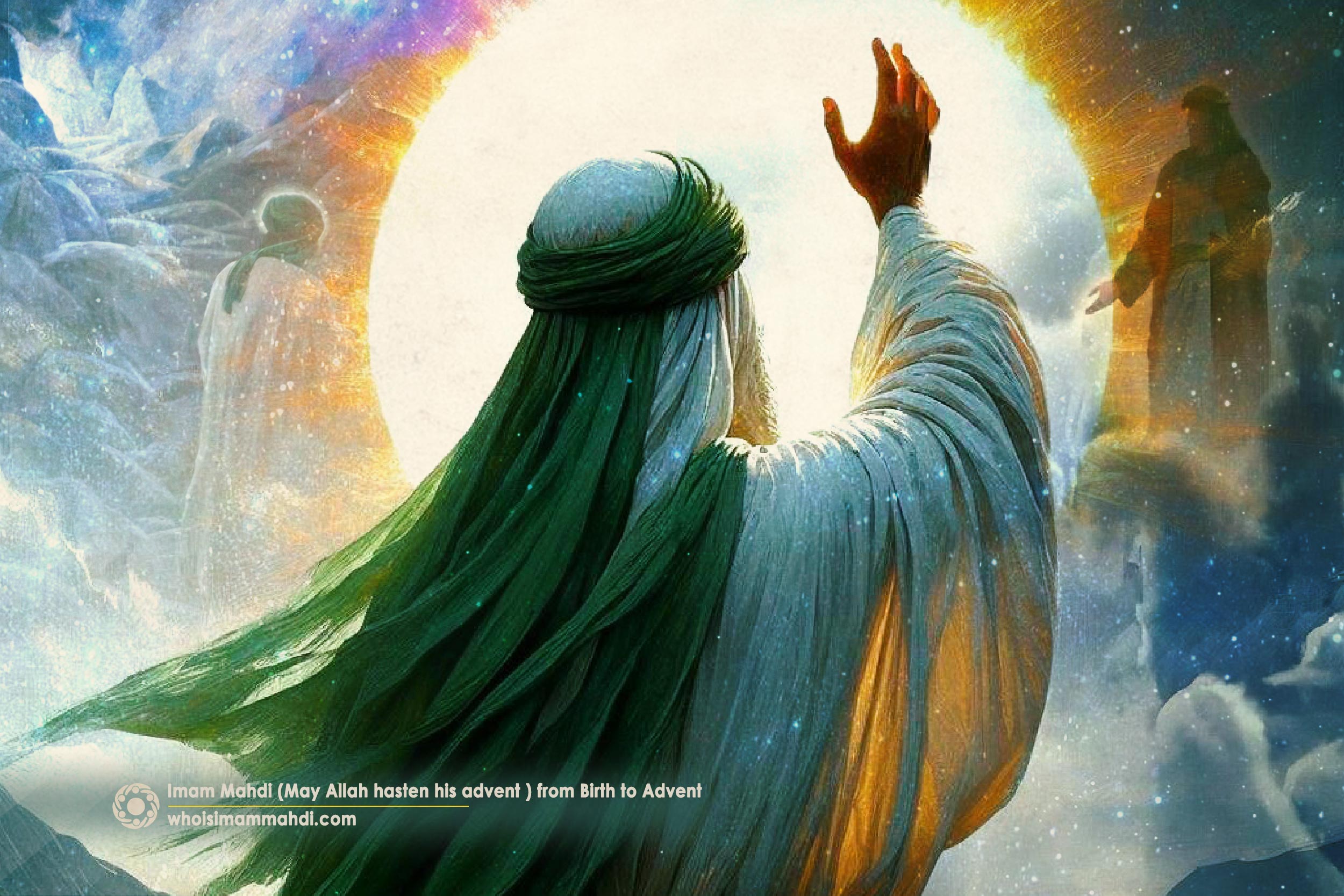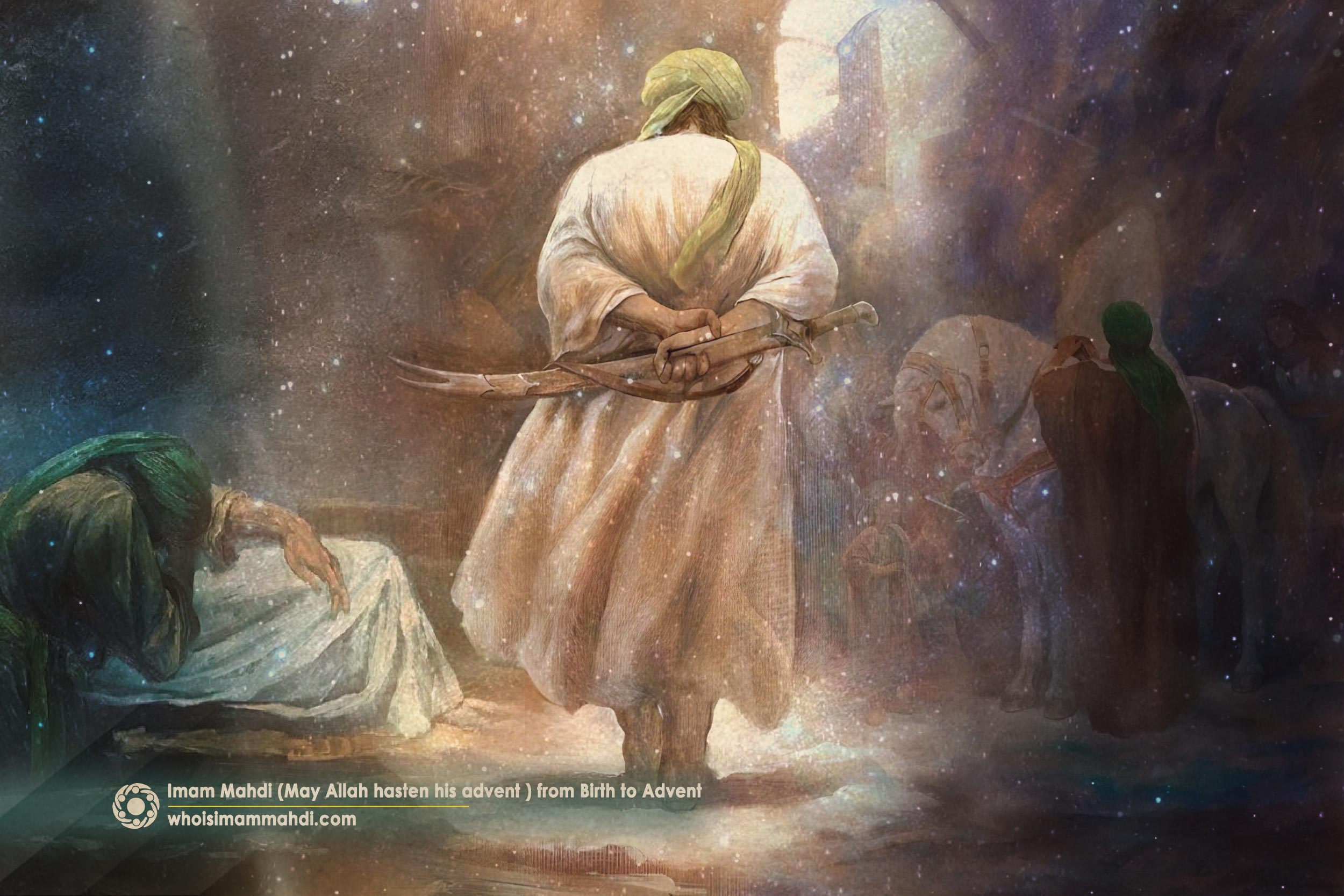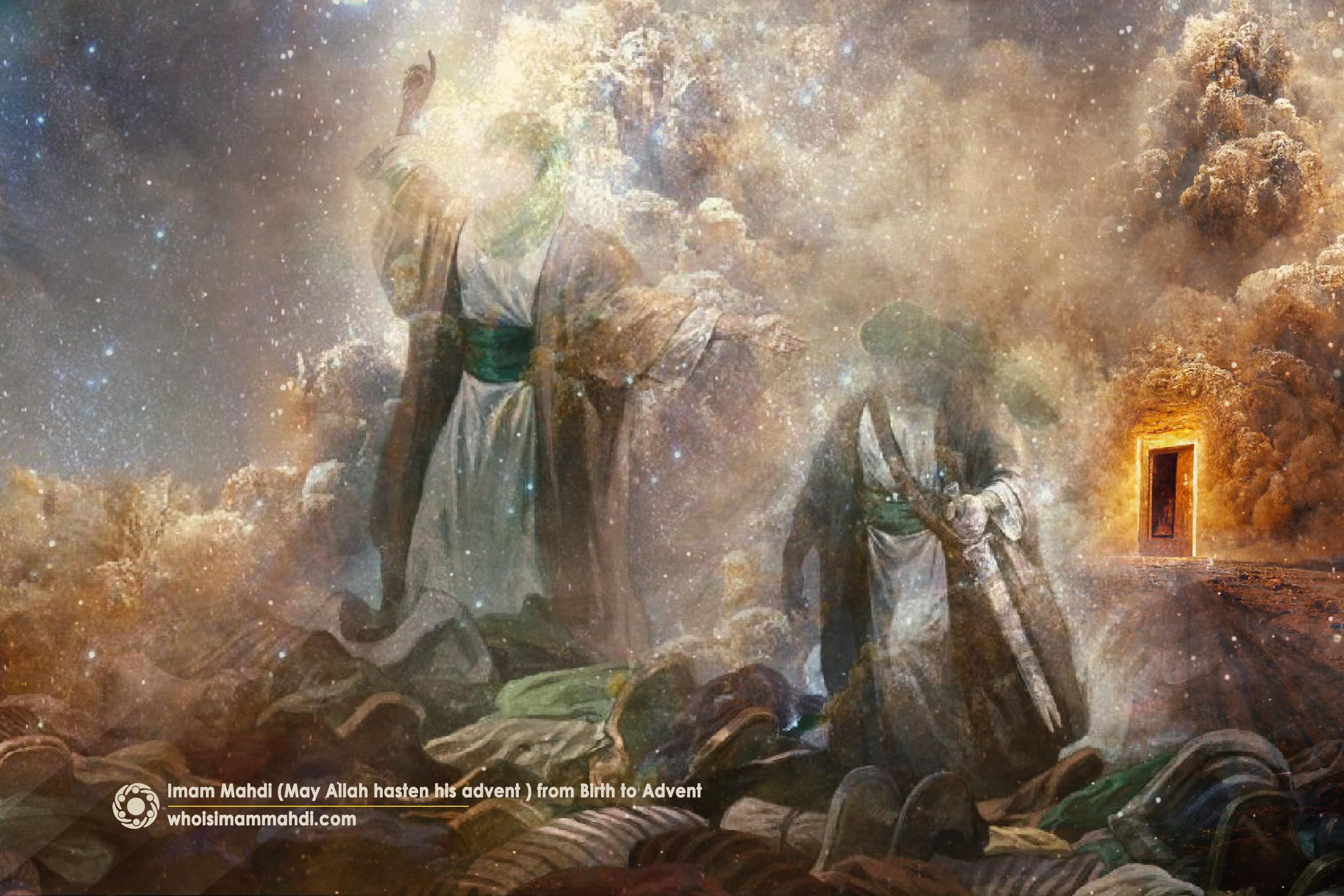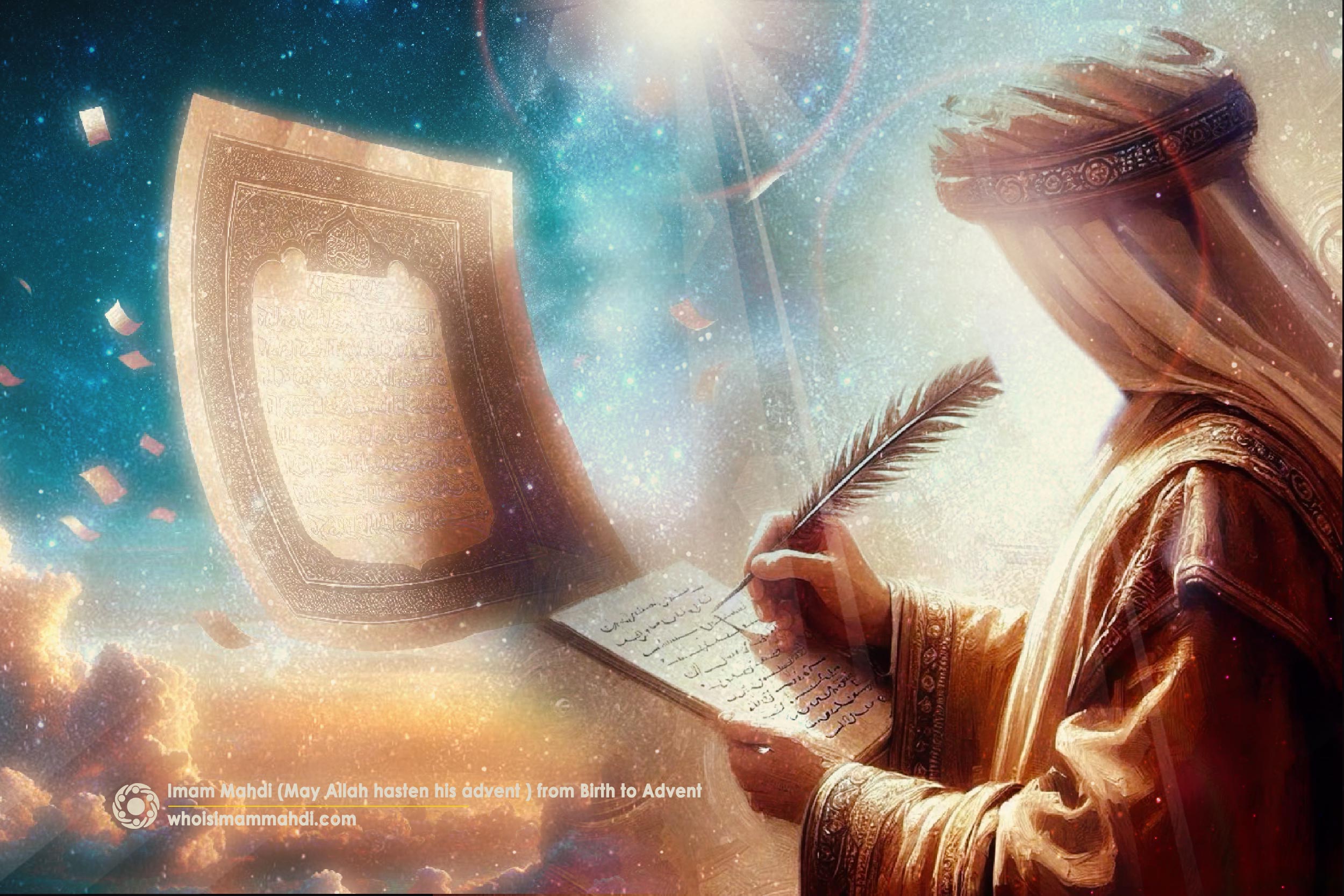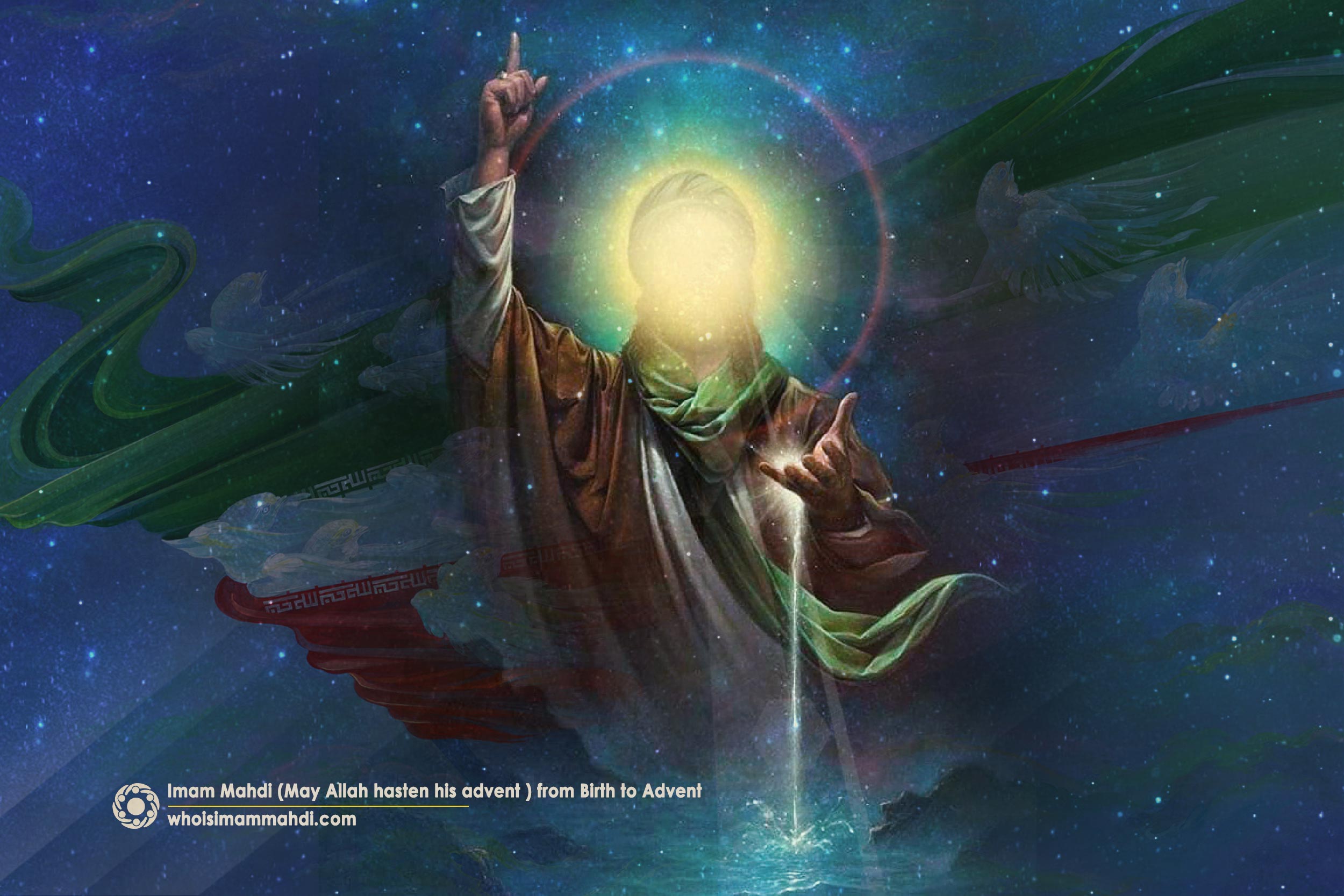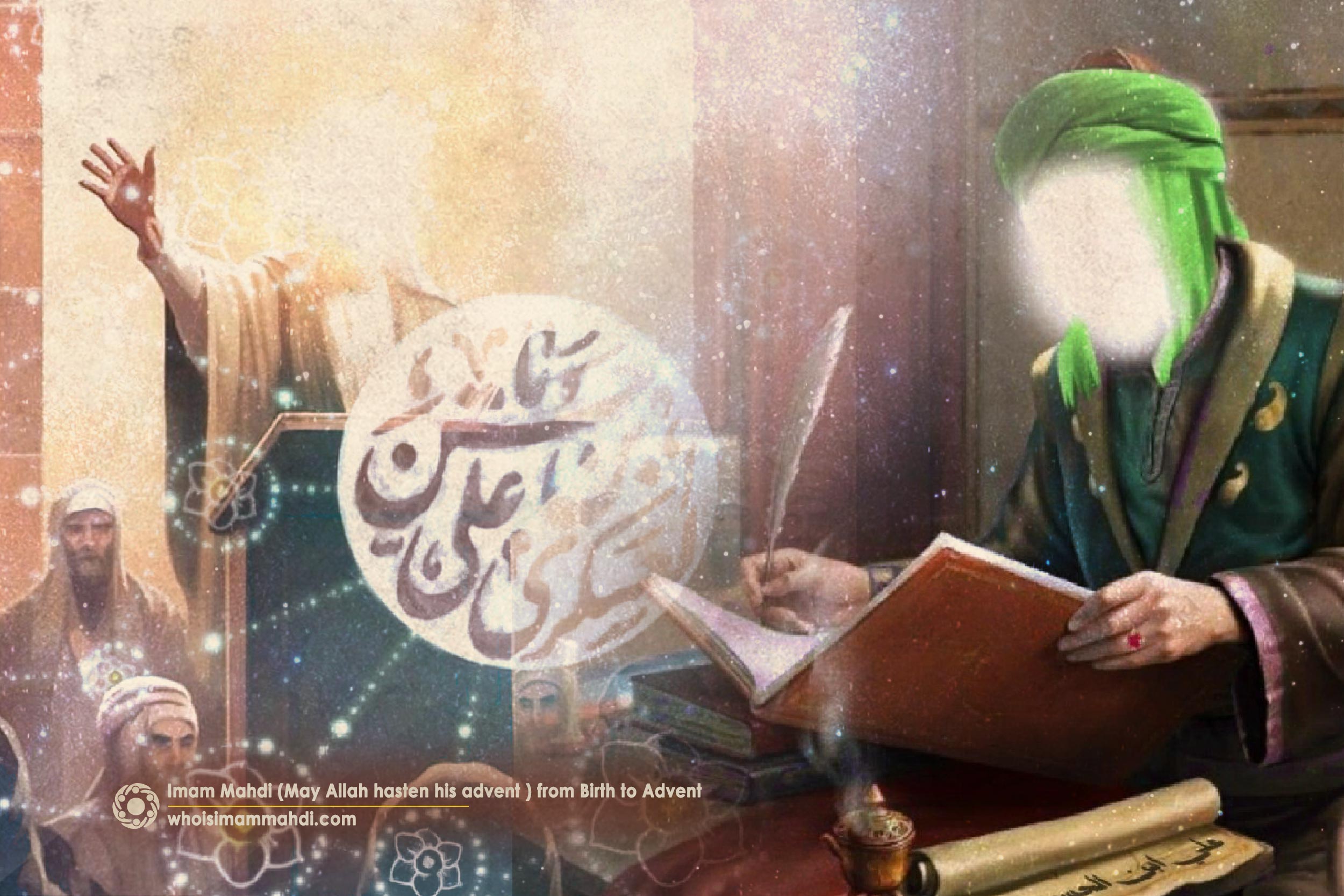What Happened at Ghadir Khumm?
Ghadir Khumm is a pond situated in Khumm, a location on the historic route between Mecca and Medina. Ghadir Khumm is one of the most important events in Islam. Prophet Muhammad (PBUH) issued the order for pilgrimage to Mecca in the final year of his blessed life, and most Muslims accompanied him on the journey.[1] At the end of this pilgrimage, known as the Farewell Pilgrimage, and upon his return from Mecca on the 18th of Dhu al-Hijjah in the year 10 AH, the Prophet ordered everyone to gather near the pond of Ghadir Khumm to meet him.
During the event of Ghadir Khumm, the Prophet (PBUH) delivered a comprehensive and powerful sermon, where he introduced Imam Ali (PBUH) as his successor and deputy. He explicitly stated that true salvation lies in sincere love for and loyalty to Imam Ali (PBUH) and emphasized that following him faithfully is the only path to bliss. One of the crucial points of this sermon is the explicit mention of the succession of the Ahl al-Bayt[2] and considering each of them as the best messenger, mentor, and leader in every era.
After delivering the sermon, people joyfully rushed towards Imam Ali (PBUH), showering him with congratulations, and Ghadir was alive with celebration. However, it did not take long before the Messenger of Allah (PBUH) passed away, and the pledges were forgotten to the extent that it seemed as if Ghadir, the introduction of the successor, the Prophet’s emphasis, his command to pledge allegiance to Imam Ali (PBUH), and the covenant with him had never existed. Muslims gathered in Saqifah[3] and chose their own successor to the Prophet (PBUH).
The key point is that during the event of Ghadir Khumm, Allah, through His Messenger (PBUH), clarified the responsibilities of His nation for all time. He illuminated the significance of Ghadir across different eras and revealed the secret to human bliss under its guidance.
A Review of the Event of Ghadir Khumm
To examine the event of Ghadir Khumm from a historical perspective, we need to review the events leading to it. After migrating to Medina, the Messenger of Allah (PBUH) traveled to Mecca only three times: first for the Umrah after the Treaty of Hudaybiya,[4] then for the conquest of Mecca, and finally for the Farewell Pilgrimage in the tenth year of Hijri, where he officially announced the pilgrimage so that most people could participate in this ceremony. Following this public announcement, Muhajirun,[5] Ansar,[6] tribes around Mecca and Medina, people from Yemen and other regions came to Mecca. The Prophet (PBUH) had two important intentions for this journey: to teach the rules of the Hajj Pilgrimage and to clarify people’s duties after his departure, i.e., the issue of caliphate and succession.
As soon as the rituals of the pilgrimage were completed, the Prophet immediately ordered Bilal ibn Rabah, the caller of Adhan[7] and one of his faithful companions, to convey the following order to the people: “Tomorrow, nobody should lag behind but should go to Ghadir Khumm.” The next morning, Dhu al-Hijjah 18, 10 A.H. (March 19, 632A.D.), the Prophet and his 120,000 companions went to Ghadir Khumm, including around 12,000 Yemeni pilgrims. The Prophet stated: “O people! I am the Messenger of God, respond to he who calls you to God.” He told the herald to announce that all people must stop: Those who had moved ahead must come back, and those who were lagging behind must hurry to catch up. Upon hearing this news, the horses came to a halt, and those who had advanced returned.[8] The heat was intense, and a place needed to be prepared. The Prophet ordered four of his closest companions, namely Salman al-Farsi, Abu Dharr al-Ghifari, Miqdad ibn al-Aswad, and Ammar ibn Yasir, to create a pulpit and clear the area for a ceremony that would last for three continuous days.
After performing the Asr prayer, the Prophet ascended the pulpit and signaled to Imam Ali (PBUH) to stand on his right. Imam Ali (PBUH) did so, standing one step below the Prophet. Then, the Prophet (PBUH) delivered his historic sermon.
Content of Ghadir Khumm Sermon
In reviewing the event of Ghadir Khumm and the content of the sermon,[9] we see that after praising God and affirming His Oneness, the Prophet declared that he was tasked with delivering God’s revelation to the people and feared God’s punishment because God had revealed to him: “O Messenger! Convey everything revealed to you from your Lord. If you do not, then you have not delivered His message. Allah will [certainly] protect you from the people. Indeed, Allah does not guide the people who disbelieve.” [10] Due to fear of treachery of some people, the prophet asked Gabriel to excuse him from having to convey such a message to people, but Gabriel descended multiple times and conveyed this verse and provided clear proof for him.
The Prophet (PBUH) announced that it was the last time he was present on such an occasion and that the leadership and guardianship of his nation until the Day of Resurrection had been entrusted to Imam Ali (PBUH) and his descendants. He spoke extensively about Imam Ali’s knowledge and virtues and referred to him as Amir al-Mu’minin (Commander of the Faithful). The Prophet considered denying Imam Ali’s leadership as an unforgivable sin, and this is one of the very important promises of Ghadir. He spoke openly and explicitly about Imam Ali’s caliphate and succession and prayed for his friends while cursing their enemies.[11] The event of Ghadir Khumm is the proof for the rightfulness of the Prophet Muhammad’s Household (PBUT). He defined the position of Imamate (leadership) and highlighted its vital importance. The Prophet mentioned about two hundred virtues and merits of Imam Ali (PBUH) and warned people against jealousy towards him in this matter.
It is recorded in history that conveying this message was so crucial for the Prophet that he emphasized strongly that those present should convey the message to those absent. He considered understanding and conveying the message of Ghadir as the highest virtue. The text of the sermon at Ghadir is documented in books such as Al-Ihtijaj, Al-Yaqin, Rawdhat al-Wa’idhin, al-Tafsir, al-Ayyashi, al-Tahsin, Al-Iqbal, al-Sirat al-Mustaqim, Al-Ghadir, and Nahj al-Iman.
Introducing the Promised Mahdi (AJ) in the Ghadir Khumm Sermon
The event of Ghadir Khumm and the Ghadir sermon place significant emphasis on Imam Mahdi (AJ), with the Prophet Muhammad (PBUH) explicitly introducing him in several parts of the address. The Prophet stated that the light of Allah flows through himself, then through Imam Ali, and continues in the progeny descending from him until it reaches the Mahdi (PBUT). He identified Imam Mahdi (AJ) as the one who will establish justice on earth and reclaim rights belonging to God and the oppressed, including the infallible Imams (PBUT).[12]
In the second part of the sermon, the Prophet exclusively discusses Imam Mahdi (AJ) and describes his characteristics. This sermon serves as a definitive proof of the existence of the Imam of the Time (PBUH). Notably, during this section, the Prophet used the phrase “Lo!” or “Behold”[13] eighteen times to capture the audience’s attention. He affirmed that leadership is entrusted to Imam Ali (PBUH), with Imam Mahdi (AJ) as its culmination.[14]
The third part pertains to the end of the sermon and the time for people to pledge allegiance where once again, the Prophet mentions the leadership of Imam Mahdi (AJ) and considers him as the seal of the infallible Imams (PBUT). The climax of the sermon is when he vividly and wonderfully designs the future of the world. In the eighth part of the sermon, he specifically speaks about the rule, knowledge, guardianship, and infallibility of the Imam of the Time (PBUH). Throughout the Ghadir sermon, the Prophet mentions Imam Mahdi (AJ) approximately twenty-five times.
God, who had perfected the religion of Islam in the event of Ghadir Khumm and resolved the issue of guidance and guardianship for all peoples, revealed the verse of Ikmal al-Din (Perfection of Religion).[15] The Shia and Sunni have different perspectives on the interpretation of this verse and the concept of perfecting of the religion. Sunnis believe that this perfection of the religion pertains to the perfection of religious rulings. However, the Shia believe that it relates to the leadership of Imam Ali and the Household of Prophet Muhammad (PBUT) because the verse tells us that disbelievers are disappointed by Islam. This disappointment occurs when Muslims are under the guidance and leadership of dignified and expert mentors and leaders, who are like the Prophet and can be his successors to ensure the continuity of the religion in the best possible way.
Muslims agree that the verse of Ikmal al-Din was revealed during the Farewell Pilgrimage, but they have presented different views about the day it was revealed. Most Shia scholars believe that this verse was revealed on the day of Ghadir Khumm or shortly after.[16] Sunni scholars believe that the verse was revealed on the day of Arafah.[17] Sayyid Al-Amili also believes that the verse of Ikmal al-Din was revealed twice; first on the Day of Arafah, where the Prophet refrained from announcing it for certain reasons; then after the descent of the verse of tabligh, the verse of Ikmal al-Din was revealed again on the day of Ghadir Khumm.[18]
Does the Word Mawla Mean ‘Friend’?
Some individuals have attempted to reinterpret the event of Ghadir Khumm by translating the terms wali, mawla, and wilayah as friend and friendship. However, dictionaries provide at least twenty different meanings for the Arabic word Wali, the majority of which pertain to leadership and guardianship.[19]
Some Sunni Muslims propose that the Prophet (PBUH) intended to convey “Whoever considers me a friend, Ali is also his friend.” There is no doubt that Imam Ali (PBUH) held a significantly elevated position among the companions. He was the first male to accept Islam,[20] and he was honored with the title of the Prophet’s ‘brother.’[21] The Prophet stated, “Loving Ali is a sign of faith, while hating him is a form of hypocrisy.”[22] Additionally, he was the only person who risked his life by sleeping in the Prophet’s bed when there was a plot to assassinate him.[23]
Now a few questions arise:
Does it make sense for the Prophet to keep over a hundred thousand people waiting in such extreme heat until those who had fallen behind arrived, only to then declare, “Ali is the friend of the believers”?
Furthermore, Umar[24] and Abu Bakr congratulated Ali by saying: “Today you became the mawla of all believing men and women.”[25] If, here, the word mawla means friend, then why the congratulations?[26] Was Ali the enemy of all believers before that time?
Thus the word wali or mawla in the context of Ghadir Khumm does not mean a simple friend, rather it means master and guardian who has more authority over believers than what they have over themselves, as Prophet himself mentioned by saying “Do I not have more authority (awla) over believers than what they have over themselves?” At least sixty-four Sunni traditionists have quoted this preceding question of the Prophet, among them are al-Tirmidhi, al- Nisa’i, Ibn Majah, Ahmad bin Hanbal.
It is noteworthy that the terms wali and mawla are often found in the Quran, frequently signifying master and guardian, as seen in verse 257 of Surah Baqarah.[27]
Events After the Ghadir Khumm Sermon
After declaring the leadership and guardianship of Imam Ali (PBUH), the Prophet (PBUH) stated, “By Allah, none shall be able to explain to you its warnings and its mysteries, nor shall anyone clarify its interpretation, other than the one that I have grasped his hand, brought up beside myself.”[28] Then he raised the hand of Imam Ali (PBUH) so high that people saw their armpits. Then the Prophet (PBUH) said, “Whoever I am his master (wali), Ali is his master.”[29] He then continued, “I have, indeed, sworn allegiance to Allah, and Ali has sworn allegiance to me, and, on behalf of Allah, the Mighty and Majestic, I require you to swear the oath of allegiance to him….”[30]
Public Allegiance
Due to the large number of people, it was possible that some may refrain from swearing allegiance to Imam Ali (PBUH), so Prophet ordered people to say these words in one voice: “We heard, obeyed, are satisfied, and are submitted to what you have conveyed to us from our Lord and your Lord with regard to the authority of Ali, the Commander of the Believers, and the authority of the Imams from his loins. We pledge allegiance to you in this regard with our hearts, our souls, our tongues, and our hands. Anyone (of us) who can reach him shall shake his hand, otherwise he shall affirm the covenant by his tongue. We shall not seek any substitute for it, nor shall Allah see in our souls any diversion from it.”[31]
It is interesting to note that Ghadir Khumm is the only time in history where the Prophet (PBUH) repeatedly asked people to congratulate him. He states, “Allah has assigned me the prophecy and my household the Imamate (leadership).”[32]
The first individuals who rushed to pledge allegiance to Imam Ali (PBUH) were those who broke their covenant soon after and some who had inflicted major blows on him. The first ones to pledge allegiance to him at Ghadir Khumm were individuals like Abu Bakr, Umar ibn Khattab, Uthman, Talha, and Zubair. As we mentioned, it is documented in history that at the time of pledging allegiance to the Imam, Umar said, “Congratulations O son of Abu Talib! Today you became the leader (mawla) of all believing men and women.”
The objection of Umar and Abu Bakr to what happened at Ghadir Khumm showed their hypocrisy because before pledging allegiance to Imam Ali (PBUH), they objected to the Prophet (OBUH) by asking, “Is this command from Allah or from you?” The Prophet replied, “It is from Allah.”[33]
Men’s Allegiance
After the end of the sermon, people rushed towards the Messenger of Allah and Imam Ali (PBUT) with salawat,[34] congratulations, and greetings, eager to pledge allegiance.
The Prophet (PBUH) ordered to set up a tent for people to pledge allegiance easily. People came in groups to give allegiance to the Prophet (PBUH), then went to Imam Ali’s tent and pledged allegiance to him by shaking hands.
Women’s Allegiance
The Prophet (PBUH) ordered to prepare a water container and install a curtain so that half of the container would be on one side of the curtain and the other half on the other side. In this way, women could place their hands in one side of the container and Imam Ali (PBUH) on the other side. Therefore, pledging allegiance would be performed in this manner.
The ceremony of the oath of allegiance continued for three continuous days. Some Muslims composed poems about that event, first of whom was Hassan b. Thabit. He sought the Prophet’s (PBUH) permission to write verses about the appointment of Imam Ali (AS) as leader and the guidance of the Ummah.[35] Then the Prophet placed his turban called “Sahab” on Imam Ali’s head as a symbol of honor.
Why Is the Event of Ghadir Khumm the Perfection of Religion?
The earth will never be devoid of the divine proof even for a moment; otherwise, it will sallow its inhabitants. God has appointed a prophet in every era to guide and lead people,[36] even at times when there were no prophets, the saints of God like Abdul Muttalib would guide humanity.
Prophet Muhammad (PBUH), the final messenger of God, was sent to reveal Islam as the perfect and complete religion, fulfilling the divine purpose of all previous religions, but here a few questions arise: What would happen to people after the Prophet (PBUH)? How could people keep their faith strong without another divine prophet or proof? What about all the questions and doubts that would come up? The Prophet brought the perfect religion, but how could he possibly cover everything in his limited lifetime? What about all the people who would come after him? Did he have a way to guide them too?
Although the basic principles of Islam were instructed by the Prophet, and the Quran has become available to humankind, this religion requires centuries of analysis and elucidation. The Quran has seventy layers,[37] and its depth is explored and illuminated by centuries of teaching, uncovering, and witnessing. This crucial duty could only be performed by a perfect and infallible human being like the Messenger of Allah (PBUH), who fully knows the truth of religion, the human soul, humanology, God, and ontology.
Now we may better understand why the Prophet (PBUH) was so happy at the event of Ghadir Khumm and why God said to him, “Today I have perfected your religion.” Surely, if the Prophet had not introduced a reliable and faithful successor for nurturing human beings after himself and left this world, all the efforts of 124,000 prophets and all the saints of God would have been in vain. Therefore, God appointed Imam Ali (PBUH) as the worthy and rightful successor to the Messenger of Allah (PBUH) to take on the crucial responsibility of guiding and nurturing humanity so that they become deputies of God on earth. The point is that Imam Ali’s physical lifespan was also limited and people’s guidance had to continue after him. In fact, the event of Ghadir Khumm has been repeated in the era of each 12 infallible Imam (PBUT) until today. Each infallible Imam in his time was exactly like Imam Ali (PBUH), and those who remained loyal to their Imams were like the companions who pledged true allegiance to Imam Ali (PBUH) at Ghadir Khumm.
Ghadir Khumm: The Covenants and their Aftermath
The events of Ghadir Khumm and Saqifah Bani Sa’idah[38] are two important incidents in Islamic history that became sources of many blessings and troubles. Both events are related to the issue of succession and leadership of the Muslim community after the Messenger of Allah (PBUH). We mentioned that the Prophet introduced his successor with utmost clarity and transparency at Ghadir Khumm. He warned about the consequences of not obeying Imam Ali (PBUH), and he made his companions pledge allegiance to Imam Ali (PBUH). However, with the news of the passing of the Messenger of Allah (PBUH), while the Prophet’s body was not yet buried, a group of the Ansar gathered under a shade called Saqifah Bani Sa’idah to settle the issue of the Prophet’s successor. They decided to appoint a person named Sa’d ibn Ubadah as his successor without considering the event of Ghadir Khumm. Some of the Muhajirun like Umar and Abu Bakr heard about it and rushed to Saqifah. News of the Saqifah convention also reached Imam Ali (PBUH) and Abbas ibn Abdul-Muttalib, but they remained focused on the solemn task of preparing the Prophet (PBUH) for his final washing and burial.
More and more people gathered at Saqifah, each hoping to secure a share in the succession of the Prophet. The Ansar, who had celebrated the event of Ghadir Khumm alongside the Prophet and Imam Ali (PBUT), sought to choose a successor from among themselves, while the Muhajirun were determined to claim leadership by any means possible.
Ultimately, Abu Bakr was chosen as the successor to the Prophet (PBUH) by a small group of prominent companions. After the news was spread, prominent companions like Imam Ali (PBUH), Abbas, and about twelve others objected to this allegiance. Loyal companions like Salman, Abu Dharr, Miqdad, Ibn Abi Ka’b, Zubair, Ubaidullah ibn Abbas, and a few others did not participate in the public allegiance initially, but some of them were eventually forced to do so.
A day after the Saqifah allegiance, the companions decided to bring the Muslims to the Prophet’s Mosque and turn the private allegiance at Saqifah into a public allegiance. Among the individuals who were supposed to pledge allegiance, Imam Ali (PBUH) was the most significant, as the event of Ghadir Khumm was a testament to his rightful and undeniable leadership. He refused to pledge allegiance since he was the rightful successor. Following his resistance, Lady Fatima (PBUH), the daughter of the Prophet of Islam and the wife of Imam Ali (PBUH), also protested. However, she was unjustly and cruelly treated and ultimately martyred. The usurpers of the leadership did not back down from imposing allegiance on Imam Ali (PBUH) with shameless behavior until they forced him to pledge allegiance to Abu Bakr.
Imam Ali and Lady Fatima (PBUT) made great efforts to enlighten companions, but only forty-four individuals accepted their invitation. Ultimately, only four of them namely Salman, Abu Dharr, Miqdad, and Zubair vowed allegiance to Imam Ali (PBUH).
Ghadir Khumm was not just a singular event in the tenth year of Hijri. It represents a continuous covenant, beginning with the appointment of Imam Ali (PBUH) as the rightful successor and enduring until the advent of the Promised Mahdi (AJ). During the 250-year leadership of each of the infallible Imams (PBUT), there were ten Ghadir events. Ghadir is the most important celebration for humanity because, at the event of Ghadir Khumm, God, through the Angel of Revelation, declared to the Seal of Prophets (PBUH) that human beings cannot actualize their potentials without an expert and infallible leader in every era. Human beings can fulfill their potentials only if they are nurtured and trained under the guidance of an expert and infallible mentor. Each of us needs to pledge allegiance to the Imam of the Time during our lifetime, and the key to solving all the problems in the world lies in our true, heartfelt allegiance to the Imam of our Time (AJ).
[1]. Ibn Hisham, Al-Sira, vol. 2, p. 601.
[2]. Prophet Muhammad’s Household (PBUT)
[3]. Saqifah Bani Sa’idah was a roofed building in Medina where, after Prophet Muhammad’s departure, some of his companions gathered and pledged allegiance to Abu Bakr.
[4]. For more information, see Sayyid Ali Asghar Razwy, A Restatement of the History of Islam and Muslims. United Kingdom: World Federation of KSI Muslim Communities.
[5]. The first converts to Islam and Prophet Muhammad’s advisors and relatives, who emigrated with him from Mecca to Medina.
[6]. The ‘Helpers’ or ‘Those who bring victory’ were the local inhabitants of Medina who took prophet Muhammad and his followers (the Muhajirun) into their homes when they emigrated from Mecca.
[7]. The Islamic call to prayer
[8]. Al-Ya’qubi, Tarikh al-Ya’qubi, vol. 2, p. 118.
[9]. For the full text of the sermon, see Ghadir Sermon: The Sermon of Prophet Muhammad (S) At Ghadir Khumm, trans. Vahid Majd. Tehran: Naba Cultural Organization, 2005, p. 44.
[10]. Quran: 5:67 (Known as the verse of tabligh (Propagation))
[11]. Al-Baladhuri, Ansab al-ashraf, vol. 2, p. 111; Ibn Kathir, Al-Bidaya wa al-nihaya, vol. 7, p. 349.
[12]. Ghadir Sermon, p. 52.
[13]. Ala ألا
[14]. Ghadir Sermon, pp. 60-61.
[15]. “This day I have perfected your religion, completed My favors to you and have chosen Islam as a religion.” (Quran, 5:3)
[16]. Kulaynī, al-Kafi, vol. 1, p. 289-292; Baḥrani, Al-Burhan fi Tafsir al-Quran, vol. 1, p. 434-447.
[17]. Sayyid b. Ṭāwūs, al-Yaqīn, p. 344; Bayḍāwī, Anwār al-tanzīl, vol. 1, p. 255; Ālūsī, Rūḥ al-maʿānī, vol. 4, p. 90-91.
[18]. Sayyid Amili, Al-Ṣaḥīḥ min Sīrat al-Nabī al-A’ẓam, vol. 31, p. 311.
[19]. For more information, see A Shi’ite Encyclopedia, Ahlul Bayt Digital Islamic Library Project, p. 252.
[20]. Sahih Tirmidhi, vol. 5, p. 642; Musnad Ahmad ibn Hanbal, vol. 4, p. 317; Mustadrak Al- Hakim, vol. 3, pp. 111,136; Sirah Ibn Hisham, p. 345; Ibn Sa’d, Tabaqat, vol. 3, p. 71, 72; Ibn Abd al-Bar, Al-Istiab, vol. 3, p. 30.
[21]. Sahih Tirmidhi vol. 5, p. 363; Sirah Ibn Hisham, p. 504; Tahdhib, vol. 4, p. 251.
[22]. Sahih Muslim, vol. 1, p. 48; Sahih Tirmidhi, vol. 5, p. 643; Sunan Ibn Majah, vol. 1, p. 142; Musnad Ahmad ibn Hanbal vol. 1, pp. 84, 95, 128.
[23]. Al-Miqrizi, Imta’ Al-Asma’ 1:39.
[24]. Ibn Kathir, Al-Bidaya wa al-nihaya, vol. 7, p. 349.
[25]. Al-Manawi, Fayd al-ghadir, vol. 6, p. 217; Musnad Ahmad ibn Hanbal, vol. 4, p. 281; Ibn Maghazili, Al-Manaqib, vol. 1, p. 46; Ibn Kathir, Al-Bidaya wa al-nihaya, vol. 7, p. 349.
[26]. Amini, Al-Ghadir, vol. 1, p. 667.
[27]. “Allah is the Guardian of the believers—He brings them out of darkness and into light.”
[28]. Ghadir Sermon, p. 44.
[29]. Ibn Athir, Usd al-ghaba, vol. 5, p. 253; Al-Kulayni, Al-Kafi, vol. 2, p. 27.
[30]. Ghadir Sermon, p. 61.
[31]. Ibid, p. 66-67.
[32]. Majlisi, Bihar al-Anwar, vol. 37, p. 230.
[33]. Bihar al-Anwar, vol. 28, pp. 106, 129.
[34]. Salutations to the Prophet and his Household
[35]. Al-Tusi, Al-Iqtisad, p. 351; Al-Sharif al-Radi, Khasa’is al-a’imma, p. 43.
[36]. Shaykh Saduq, Kamaaluddin wa Tamaamun Ni’ma, trans. Sayyid Athar Husayn S.H. Rizvi. Mumbai: Az-Zahra Publications, vol. 1, p. 195.
[37]. Ibn Abi Jumur Ahsa’i, Awali al-la’ali, vol. 4, p. 107.
[38]. For more information on Saqifah, see Sayyid Husayn Muhammad Ja’fari, The Origins and Early Development of Shia Islam. London & Beirut: Longman Group & Librairie Du Liban, 1979, chapter 2.

